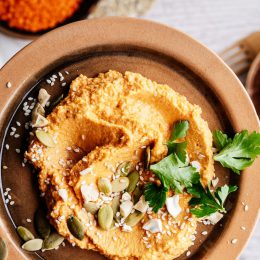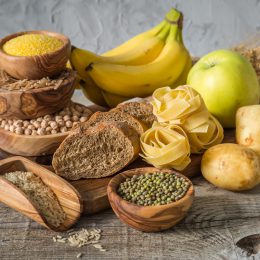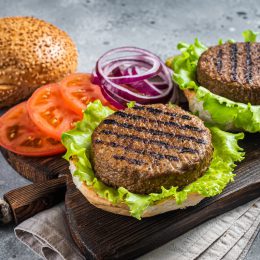6 Foods That Strengthen Your Bones
Lower your risk of osteoporosis by eating more of these key nutrients.

Most of us grew up drinking a glass of milk a day, and we had the mustaches to prove it. The idea, touted loudly by Mom, was that the calcium contained in every glass would help prevent bone fractures and osteoporosis later in life.
Mom was right. Calcium is an essential nutrient for a variety of internal processes, but 99 percent of it lives in our bones and teeth, says Carrie Karvonen-Gutierrez, Ph.D., a musculoskeletal epidemiologist and assistant professor at the University of Michigan School of Public Health.
“Each day, we lose calcium through our skin, nails, hair, sweat, and urine, and our bodies cannot produce new calcium,” Karvonen-Gutierrez says. “That’s why it’s important to get calcium from the food we eat. When we don’t get enough for our body’s needs, it gets taken from our bones.”
One cup of cow’s milk is packed with as much as 30 percent of your daily recommended intake of calcium. You can also get it from yogurt, cheese, dark greens, and other foods. Just as important, however, are foods that help our bodies absorb and use the calcium we consume. Add these six to your shopping list today.
Salmon
After calcium, vitamin D is the most important nutrient for your bones, Karvonen-Gutierrez says. That’s because bone is constantly breaking down and being replaced by new calcium—a process called remodeling. Without appropriate vitamin D consumption, our bodies can’t absorb this calcium, and our bones weaken.
The sun is our primary source of vitamin D, but as we age, the body needs dietary help reaching its daily D goals.
Salmon is one of the few sources at the supermarket. One serving contains between 60 percent to 120 percent of your daily recommended intake. The difference? Farmed versus wild-caught. The former is fine, but the latter is an unparalleled bone-builder.
You can also obtain vitamin D from fortified foods. A great choice is cereal, which you can eat from a bowl filled with calcium-rich milk!
Spinach
Popeye ate spinach to accelerate muscle growth, but his bone health probably wasn’t too shabby either.
First, it’s one of the best plant-based sources of calcium you can find. And it’s loaded with vitamin K too, which helps the calcium-binding process and allows bone to harden.
“Chlorophyll is the substance that gives plants their green color and provides vitamin K,” says Heidi Skolnik, M.S., a certified dietitian and trustee for the National Osteoporosis Foundation. This means that, in addition to spinach, you can also meet your vitamin K needs by eating kale, Brussels sprouts, broccoli, and asparagus.
Sweet Potatoes
Without potassium, your body takes minerals stored in your bones and uses them to keep its pH level in balance, Skolnik says. So when you’re not replenishing your potassium stores, this process makes your skeleton weaker.
A diet that meets its daily recommended intake of potassium—4,700 mg—is outstanding when it comes to maintaining bone health. One medium sweet potato gets you about 12 percent of the way there. It will also add some magnesium to your system, which helps activate the vitamin D that allows for calcium absorption.
Other sources of potassium include beans, bananas, oranges, spinach, avocados, and squash.
Prunes
Researchers at Florida State University found that women who ate dried plums daily showed a slower rate of bone breakdown and increased bone density compared to a similar group of women who ate dried apples daily instead.
Prunes are also a solid source of potassium, but the main reason they improve bone health in such a significant way is the presence of polyphenols, a type of antioxidant that reduces bone loss.
A serving of five or six prunes per day will give your bones the boost you’re hoping for, but consider varying your polyphenol sources throughout the week. Prunes are acidic, and too much acid in your bloodstream can actually leach calcium from your bones. Less acidic options include strawberries, raspberries, cherries, and pomegranates.
Subscribe to our newsletter
It's quick and easy. You could be one of the 13 million people who are eligible.
Already a member? Click to discover our 15,000+ participating locations.
Follow Us
Onions
While they’re in almost everything, including a particularly delicious French soup, onions aren’t typically thought of as a health superfood. That’s a mistake because they’re anti-inflammatory, great for your immune system, and—yes—terrific for your bone health.
A study in the journal Menopause found that women over 50 who ate onions every day were 20 percent less likely to suffer a hip fracture and had 5 percent more bone density than women who ate onions only once a month.
The research doesn’t indicate what exactly makes onions good for your bones, but the vegetable is high in flavonoids, which other studies suggest is beneficial to bone health. Other flavonoid-rich foods include berries, citrus fruits, and green tea.
Decaffeinated Beverages
“Caffeine is known to decrease absorption of calcium, and ingestion of high amounts may be a risk factor for bone loss,” Karvonen-Gutierrez says.
This doesn’t mean you can’t ever have a cup of caffeinated coffee, but limiting yourself to one per day at most—and adding milk for calcium—is the ideal way to balance your need for a boost with the best bone-health practices.
Finally, an important note: Calcium alone can’t prevent osteoporosis and other skeletal problems. Genetics and lifestyle play a role as well. While fortifying your diet with calcium-rich foods may be number one on your to-do list, equally important are sleeping at least seven hours a night, exercising regularly, and avoiding smoking.
Check Your SilverSneakers Eligibility Instantly
SilverSneakers gives you free, unlimited access to more than 16,000 gyms and fitness centers across the nation, plus classes and tools designed to keep older adults strong and independent. Check your eligibility instantly here.
Already a member? Get your SilverSneakers member ID and exclusive content by logging in to or creating your online account here.





